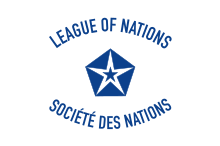Date/Time
Date(s) - Monday 11 February 2019
8:00 pm - 9:00 pm
Location
Duke Street Church
Categories No Categories
Dr Steven Woodbridge is Senior Lecturer in History at the University of Kingston. He is a specialist in 20th-century British and European history, with particular expertise in British fascist ideology and the wider nature of fascism and the contemporary extreme right. He also has research interests in local history, the history of film, political thought, and the secret state. He has contributed sevarl articles to our annual journal, Richmond History, and gave a very well received talk to us in March 2017 on Richmond and the Right: The National Citizens Union, British Fascists and other fringe groups in the interwar period.
The League of Nations, a predecessor organisation to the United Nations, was founded in 1920 as a result of the Paris Peace Conference that ended the First World War. It was the first worldwide intergovernmental organisation that had a principal mission to maintain world peace.
The League of Nations Union was formed in the UK in 1918 to lobby for the wholehearted accceptance by the British people of the League of Nations, and also to raise awareness at local level of wider international and world issues. It became one of Britain’s largest and most influential organisations during the interwar period, National membership peaked in 1931 at just over 400,000.
Steven Woodbridge will talk about the history of the union’s branch in Richmond, which was formed in May 1919 after a public meeting at the Castle Theatre. He will explore issues that the branch campaigned on and provide stories about some of its social activities such as dances, film shows and educational activities. He will also look at some of the key personalities who became its members and activitists.
John Foley reports on Steven Woodbridge’s talk
And after the jubilation, the flag-waving crowds of euphoric Londoners celebrating the news of the Armistice of November 1918 on chilly, rickety, open-topped buses, lampposts and rooftops, and the national relief that the guns had fallen silent and the carnage, killing and casualties of four hideous years of world war were suddenly over . . . what then?
Soon after, in early 1919, the Paris peace negotiations began at Versailles. A leading light of these talks was the idealistic American Democrat President Woodrow Wilson. It was Wilson who had finally persuaded Congress to declare war on Germany, Austria, Hungary and their Axis Allies in April 1917. The addition of fresh American military might and money at a critical time had meant salvation for France and Britain on the Western Front during the final clash of arms in 1918, which ended with the Axis powers asking for the armistice. For President Wilson, a cherished aim was to make the post-war world safe for democracy and to prevent recurrence of a similar future war, by the formation of the League of Nations. The League should form a general association of nations to help guarantee political and territorial independence of all states. And at the Versailles Peace Conference a draft covenant for such a league was approved.
Dr Steven Woodbridge, in a welcome return to the Society, told us about the League of Nations Union (as opposed to the League itself) and his recent attempts to trace evidence of its activities in Kingston and locally. Surprising, perhaps, to many to be told that this Union, formed in London in November 1918 to lobby for the promotion and acceptance of the League of Nations and its aims, was to grow into one of Britain’s largest voluntary associations in the interwar period. In 1931 national membership was to peak at just over 400,000 people.
Locally a branch of this Union was formed at a public meeting at the Castle Hotel in May 1919. Speeches in support were made by the Home Secretary Viscount Cave, and J. P. Clynes, the Labour MP who would be very active in support. The Union tried to encourage political cross-party support and to interest young people. Cash prizes were offered for good essays by schoolchildren. Members of the clergy were especially enthusiastic, and women (just recently given the vote) were encouraged to take part. There were approaches to working men’s clubs, and lectures and film shows arranged. And the Union does appear to have had the effect that the importance of the work of the League in international affairs was indeed discussed and debated locally, at political and social meetings, and generally: see Dr Woodbridge’s comprehensive article on this subject in Richmond History 39 (2018).
But, with hindsight, perhaps the League never really had a chance if preventing a further recurrence of major international conflict was its foremost aim (1939 was not many years away). The trouble was, whilst Wilson’s League was indeed duly founded, and to an extent flourished in Geneva, poor Wilson had a stroke and did not live long to see it. More seriously, the US Congress rejected the idea that their country should itself be a member, and America withdrew from European affairs until 1942. Another major European power, Soviet Russia, was excluded from involvement in the League’s formation, while – most important of all – defeated and bitter Weimar Germany was a member for only a few years, and like Italy was soon withdrawn again by its 1930s‘ totalitarian masters. Without the involvement of Europe’s most powerful countries, peace was surely doomed? But the final surprise, perhaps: the League survived until 1946, as did the Union, when the United Nations was formed. So maybe their respective interwar joint activities were not completely in vain?

